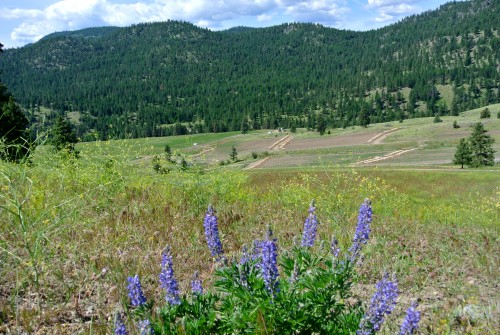 SUMMERLAND, B.C. — It is simply breathtaking, a stunning swath of wind-swept land as we look down the throat of the Garnet Valley from the highest point of the property on a perfect spring day. Wild flowers — from purple lupines to a riot of colours from daisies, fireweed and wild mustard— swing in the breeze, a breeze that never stands still. Horses with riders trundle on by, and everywhere, evidence of deer, coyotes, rabbits, rattlesnakes and marmots add to the natural cycle of life.
SUMMERLAND, B.C. — It is simply breathtaking, a stunning swath of wind-swept land as we look down the throat of the Garnet Valley from the highest point of the property on a perfect spring day. Wild flowers — from purple lupines to a riot of colours from daisies, fireweed and wild mustard— swing in the breeze, a breeze that never stands still. Horses with riders trundle on by, and everywhere, evidence of deer, coyotes, rabbits, rattlesnakes and marmots add to the natural cycle of life.
It is a self-contained environment, teeming with the flora and fauna, insects, birds and wildlife that are all part of the important symbiotic relationship for a healthy ecosystem.
It is here at the Garnet Valley Ranch, a sprawling and undulating 312 acres of beauteous and pristine ranchland in the heart of the Okanagan Valley, that the arduous task of planting up to 70 acres of Pinot Noir, Chardonnay and Riesling has just begun. The rest of the property will be left as farmland and a nature preserve.
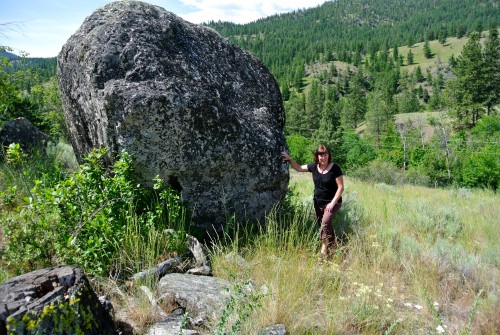
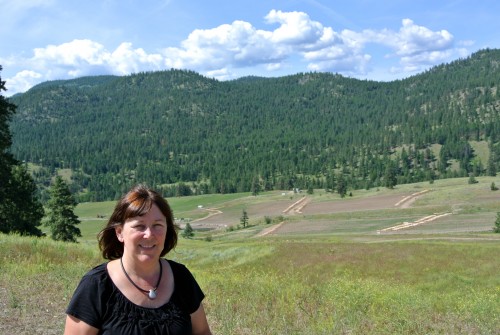
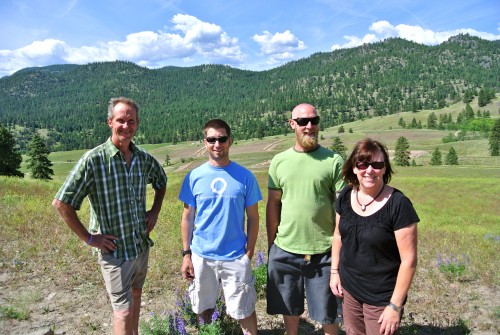 It is a bold move, an unproven piece of Summerland vineyard expanse, that Okanagan Crush Pad owners Christine Coletta, seen in the three photos above with her team and standing by a unique rock on the new property, and Steve Lornie hope will yield the kind of grapes they want to fulfil their dream as an organic winery crafting a portfolio of natural wines with grapes sourced from their own vineyards and farmed the way they want to farm it.
It is a bold move, an unproven piece of Summerland vineyard expanse, that Okanagan Crush Pad owners Christine Coletta, seen in the three photos above with her team and standing by a unique rock on the new property, and Steve Lornie hope will yield the kind of grapes they want to fulfil their dream as an organic winery crafting a portfolio of natural wines with grapes sourced from their own vineyards and farmed the way they want to farm it.
“We want to make our wine in the vineyard,” says Coletta.
“Our goal is to only have Summerland fruit, all organic, all made naturally without chemicals and additives. It’s about the flavour profile. We’re working hard to grow this fruit, so why hide it?”
That philosophy begins in the vineyard and ends in the bottle.
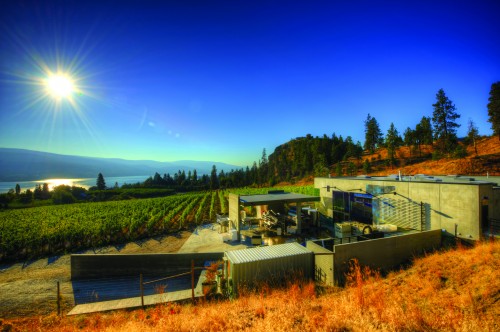
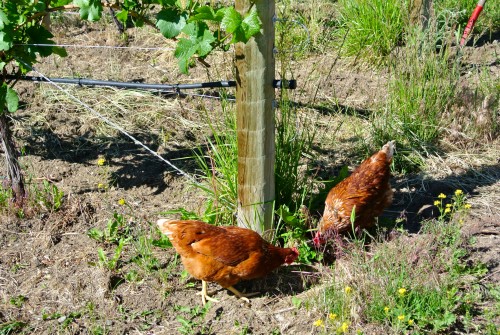
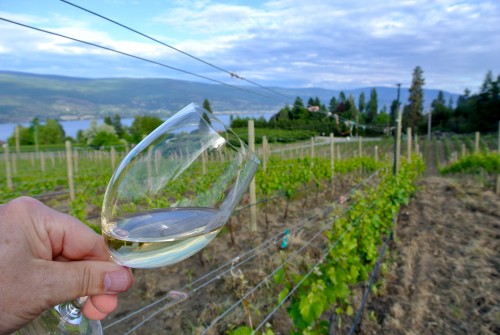 It has taken four years to convert the home estate’s Switchback Vineyard (all Pinot Gris, and shown in the above three photos) to organic fruit and now, with the winery brimming with concrete fermenters — six 4,400-litre concrete tanks from Italy (weighing a total of 39 tons), six 2,000-litre black egg-shaped concrete tanks from Sonoma, and two 800-litre clay amphoras) — OCP is close to their to goal of eliminating stainless steel in their winemaking process. In fact, Coletta has put a moratorium on purchasing any more stainless steel and wants only concrete and neutral French oak 4,500-litre foudres for processing her wines.
It has taken four years to convert the home estate’s Switchback Vineyard (all Pinot Gris, and shown in the above three photos) to organic fruit and now, with the winery brimming with concrete fermenters — six 4,400-litre concrete tanks from Italy (weighing a total of 39 tons), six 2,000-litre black egg-shaped concrete tanks from Sonoma, and two 800-litre clay amphoras) — OCP is close to their to goal of eliminating stainless steel in their winemaking process. In fact, Coletta has put a moratorium on purchasing any more stainless steel and wants only concrete and neutral French oak 4,500-litre foudres for processing her wines.
“I’m more interested in natural winemaking. Everything is natural in the vineyard and I want to take that philosophy to the winery,” she says.
The idea of using concrete for fermentation comes from the winery’s consulting winemaker, Alberto Antonini, who uses the same tanks at his Poggiotondo winery in Tuscany, and is very impressed with the results.
OCP winemakers Michael Bartier and Matt Dumayne (since publishing this story originally in Quench magazine, Matt has taken over as chief winemaker, he seen below) concur with the concept. Concrete had been used for centuries in winemaking, but was more or less abandoned with the arrival of stainless steel. These modern day concrete tanks take a forward-thinking approach to the Old World practice.
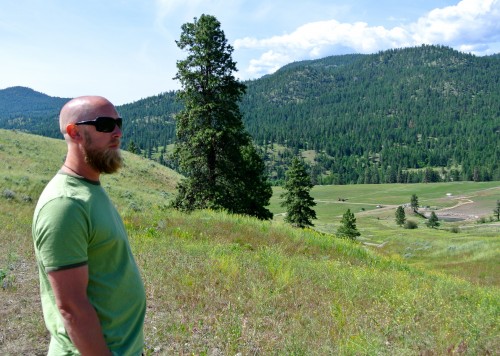 “Okanagan Crush Pad is my first experience using concrete tanks, and I am very impressed with the results,” says Dumayne. “We now have just over 38,000 litres in concrete tank capacity. They have excellent fermentation kinetics such as temperature retention. The conical shape of the tank moves the fermenting juice around in a vortex, which produces wines with enhanced depth, complexity and roundness of tannins. We have found that the resulting wines have a complexity and an enhanced creamy mineral character.”
“Okanagan Crush Pad is my first experience using concrete tanks, and I am very impressed with the results,” says Dumayne. “We now have just over 38,000 litres in concrete tank capacity. They have excellent fermentation kinetics such as temperature retention. The conical shape of the tank moves the fermenting juice around in a vortex, which produces wines with enhanced depth, complexity and roundness of tannins. We have found that the resulting wines have a complexity and an enhanced creamy mineral character.”
The Okanagan Crush Pad began life as a home for their flagship wines, Haywire and Bartier Scholefield, with a steady stream of custom crush clients designed to facilitate production of multiple small lots of wine from many different sources. Both parts of the business have been successful for Coletta and her husband, with 225 tonnes of grapes processed in 2011 and now at capacity with 450 tonnes processed in 2013 for OCP wines and six clients.
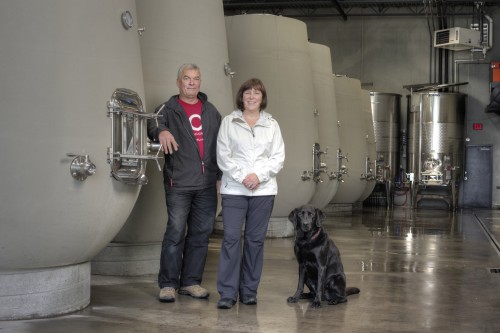
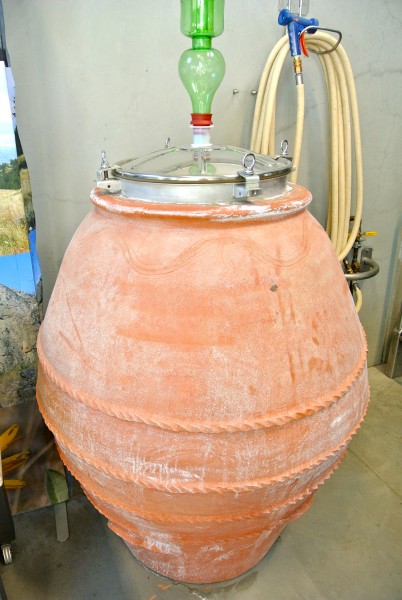
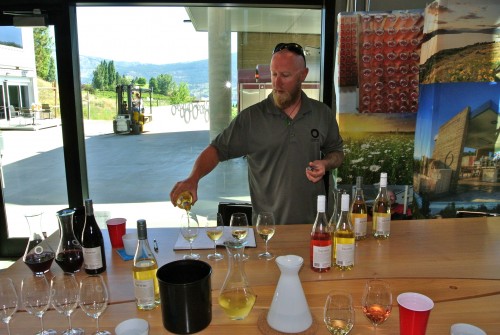
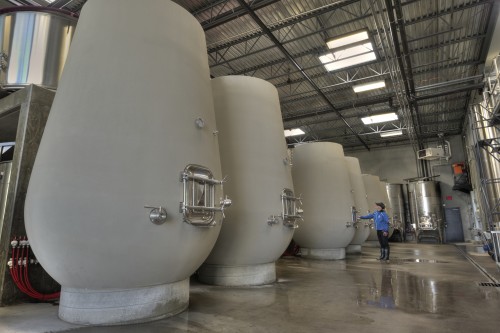
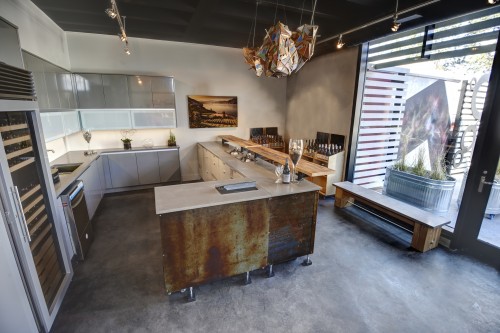 But, plans change as you grow and see beyond the vineyard growing in your own front yard. With the purchase and planting of the Garnet Valley Ranch, a short drive from the home winery, Coletta can clearly see a new day dawning for a winery that has a yearning to only process Summerland fruit, all organically farmed and all made naturally.
But, plans change as you grow and see beyond the vineyard growing in your own front yard. With the purchase and planting of the Garnet Valley Ranch, a short drive from the home winery, Coletta can clearly see a new day dawning for a winery that has a yearning to only process Summerland fruit, all organically farmed and all made naturally.
“Right now we are the tenants in the basement suite. We’re (eventually) going to move upstairs and take over the whole house,” she says.
The new biodynamic-organic Garnet Valley Vineyard, mapped out with an elaborate electro conductivity survey by “terroir” expert Pedro Parra of Chile, along with the 10 acres of Pinot Gris at the home Switchback Vineyard, will provide the fruit needed to be a self-contained 30,000 to 35,000 case production winery. There are already plans to expand the winery to accommodate the new estate fruit, which will come on stream in three or four years.
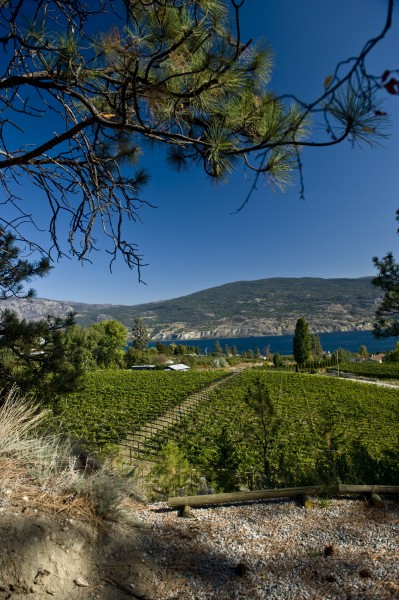 High-quality, organically-grown fruit is the core of the operation; it begins there, in the vineyard. Pinot Gris is currently the focus of the OCP (with sourced grapes for other wines) with expansion plans to include estate Pinot Noir, Pinot/Chardonnay bubbly, Riesling, rose and Chardonnay from the Garnet Valley Ranch.
High-quality, organically-grown fruit is the core of the operation; it begins there, in the vineyard. Pinot Gris is currently the focus of the OCP (with sourced grapes for other wines) with expansion plans to include estate Pinot Noir, Pinot/Chardonnay bubbly, Riesling, rose and Chardonnay from the Garnet Valley Ranch.
Beginning with the 2011 vintage, all Haywire wines were “raised in concrete,” as the label proudly displays, and all the wines use wild yeast and minimal sulphur.
The 2012 Switchback Vineyard Wild Ferment “Raised in Concrete” is one of the best expressions of Pinot Gris I have tasted from Canada. It has a wild, feral nose of apple pie and ripe fruit with complexity and creaminess on the palate to go with weight and texture that fills the mouth.
That texture is a feature that runs through entire portfolio that Dumayne shows me. It’s all fruit-driven with little oak cluttering the profile, even for the red wines, like Pinot Noir.
“We like oak as a vessel,” he says. “But not for aging. Oak dries it out and it loses its fruit. That’s the opposite of what we are trying to achieve here. We want Okanagan fruit, purity of fruit, roundness and delicacy.”
The Summerland Connection
The Okanagan Crush Pad is one of the jewels in the small but burgeoning Summerland wine fraternity, a collection of 14 wineries just off Highway 97 between Penticton and Kelowna, and in many ways has lifted the profile of the small region and taken a leading role in promoting Summerland as a destination.
Summerland is a quaint and pretty small town with a growing selection of local restaurants (don’t miss The Local) and shops.
The wineries of Summerland have come together to establish “Bottleneck Drive” to better market the region and entice wine lovers to get off the main Okanagan highway that leads to north or south to the larger wine regions of Kelowna, Okanagan Falls, Naramata, Oliver and Osoyoos.
Bottleneck Drive wineries exhibit the characteristics of the Okanagan Valley but all have a unique style. There is little sameness in the eclectic collection of mostly smaller, family-run wineries.
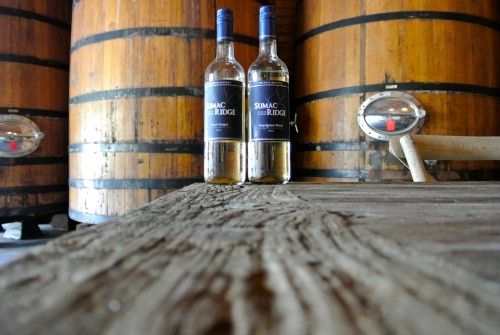 North of downtown, Sumac Ridge Estate Winery, founded by Harry McWatters, is the area’s long-established elder statesman and one of the most recognizable wineries in the Okanagan Valley. Bonitas Winery is the new kid on the block and offers stunning mountain and vineyard views from their bistro patio.
North of downtown, Sumac Ridge Estate Winery, founded by Harry McWatters, is the area’s long-established elder statesman and one of the most recognizable wineries in the Okanagan Valley. Bonitas Winery is the new kid on the block and offers stunning mountain and vineyard views from their bistro patio.
West of the town centre, visit Hollywood & Wine Estate Winery for certified organic wines, while the southern wine loop includes Thornhaven Estates Winery, Dirty Laundry Vineyard, Silk Scarf Family Boutique Winery, 8th Generation Vineyard and Adora Estate Winery.
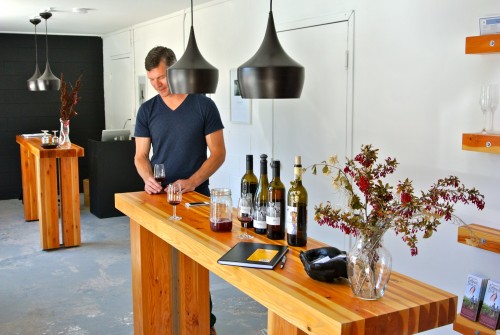 And then there’s TH Wines, a tiny winery tucked ingloriously away in a non-descript industrial park in Summerland. Vanquish from your mind that all around you are cars in various states of disrepair and step inside Tyler Harlton’s (that’s him, above) oasis, a one-man operation, each bottle of wine hand made from start to finish. Harlton, who grew up on a grain farm in Saskatchewan, is slowly churning out three to five extraordinary wines a year for a total production of 1,100 cases.
And then there’s TH Wines, a tiny winery tucked ingloriously away in a non-descript industrial park in Summerland. Vanquish from your mind that all around you are cars in various states of disrepair and step inside Tyler Harlton’s (that’s him, above) oasis, a one-man operation, each bottle of wine hand made from start to finish. Harlton, who grew up on a grain farm in Saskatchewan, is slowly churning out three to five extraordinary wines a year for a total production of 1,100 cases.
His Pinot Noir 2012 is one of the finest Pinots I have tasted from the Okanagan, with lovely fruit, subtle spice and a silky, pure feel on the palate. Small, yes, but each wine is crafted in an uncompromising style that you can only get from a one-man operation.
His spirit, his vision, is what helps to define the wineries of Summerland; not just a pretty lakeside stop on the way to more glamorous destinations. Stop in, taste and see for yourself.
The wines
(Note: most of these reviews have previously been posted on this site in various locations although we have just added to new Haywire “Lunar” wines):
Haywire Lunar Year Red 2012 ($23, released in B.C. on Dec. 1, 89 points) — The Lunar New Year Red and White are special and limited edition wines from Haywire crafted to celebrate the Lunar New Year and to welcome the Year of the Sheep. The wines were made with matching Asian cuisine in mind and will be released Dec. 1 in plenty of time to celebrate the Lunar New Year on Feb. 19. The red is mostly Gamay with a touch of Syrah and has a nose of plums, wild berries, savoury-spicy notes (hello, Syrah!), raspberry and white pepper. It’s delicious on the palate with mid-weight, but rich, vibrant red fruits to go with saucy savoury spices from the Syrah. Should match well with stir-fried vegetables, grilled sable fish and BBQ duck.
Haywire Lunar New Year White 2013 ($20, Dec. 1 release, 88 points) — A blend of Gewurztraminer, Chardonnay and Viognier with the Gew playing a large role on both the nose and palate. Aromas of lychee, rose petals, musk oil but also citrus, peach fuzz and exotic spices. In the mouth look for grapefruit, nutmeg, lychee and round, ripe fruits with ginger accents. Pair with fresh steamed seafood, seafood soup, fried noodles or rice.
Haywire Baby Bub Pink 2012 ($14 for 375 ml, 90 points) — Just like the big version (750 ml) but in a cute baby bottle with a crown cap. It’s a traditionally made pink sparkler with 51% Pinot Noir and 49% Chardonnay from grapes grown in a cool mountain vineyard site near Oliver. It is simply lovely with cherry, brioche, crisp apple, lime and piecrust notes on the nose. The palate shows a fine mousse with vibrant red fruits made in a crisp, refreshing style.
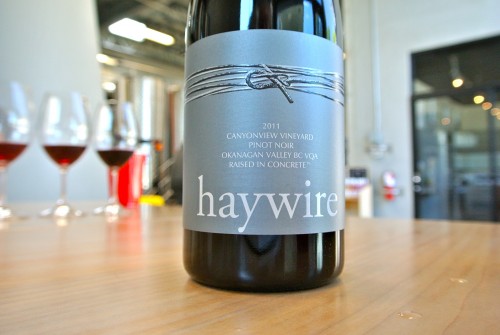 Haywire Pinot Noir 2012 ($23, 90 points) — The grapes for this Pinot were grown in Secrest Vineyard, a 35-acre cool mountain site above the town of Oliver. The wine is gently aged in old French oak barrels. The nose is all about warm cherry pie, rhubarb and raspberry with just a hint of spice. It is pure and fresh on the palate with broad red-fruit flavours, a touch of spice and good acidity through the finish.
Haywire Pinot Noir 2012 ($23, 90 points) — The grapes for this Pinot were grown in Secrest Vineyard, a 35-acre cool mountain site above the town of Oliver. The wine is gently aged in old French oak barrels. The nose is all about warm cherry pie, rhubarb and raspberry with just a hint of spice. It is pure and fresh on the palate with broad red-fruit flavours, a touch of spice and good acidity through the finish.
Haywire “Raised in Concrete” Pinot Gris 2013 ($20, 89 points) — Grapes were sourced from the Secrest Vineyard in a cool, mountain setting in Oliver and, as the name suggests, fermented in stainless steel and aged for six months in concrete tanks. It’s fresh and fruity on the nose with notes of melon, lime, pineapple, peach fuzz and lemon verbena. It has a creamy feel on the palate but maintains freshness from a zippy vein of acidity that props up the citrus, pear and melon fruit. A tasty Gris.
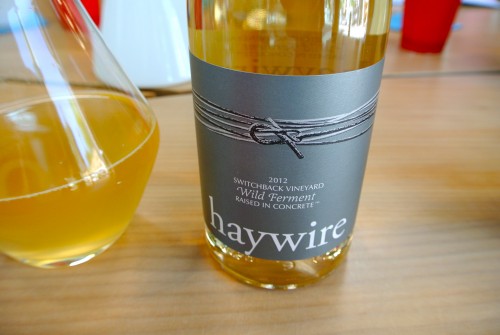 Haywire Switchback Vineyard Raised in Concrete Wild Ferment 2012 ($30, 92 points) — A showcase for B.C. Pinot Gris, with a nose of ripe apple, melon and apricot-peach notes. Such complexity and a wonderful creamy texture on the palate with balancing acidity.
Haywire Switchback Vineyard Raised in Concrete Wild Ferment 2012 ($30, 92 points) — A showcase for B.C. Pinot Gris, with a nose of ripe apple, melon and apricot-peach notes. Such complexity and a wonderful creamy texture on the palate with balancing acidity.
Haywire Raised in Concrete Sauvignon Blanc 2013 ($23, 91 points) — Aromas of fresh squeezed grapefruit, citrus and herbs. Made bone-dry with a round texture on the palate and lovely fresh citrus fruit.
Haywire Canyonview Vineyard Raised in Conrete Pinot Noir 2011 ($35, 90 points) — Beautiful nose of cherry, raspberry, bramble and light spice notes. This is juicy, silky and elegant on the palate with red fruits that are joined by defining minerality. Pure and smooth.
TH Wines Viognier-Pinot Gris 2013 ($25, 90 points) — This is a delight with a nose of apricot, peach, apple and melon. It is viscous and lush on the palate with ripe orchard fruits and touches of exotic mango and apricot.
TH Wines Pinot Noir 2012 ($30, 93 points) — Unfined and unfiltered, this is as pure an expression of Pinot as you will find anywhere. Such depth to the raspberry-cherry fruit on the nose. It is perfectly smooth and silky on the palate with gorgeously ripe fruit that echos endlessly on the finish.
SummerGate Muscat Ottonel 2012 ($20, 90 points) — SummerGate is certified organic and only produces white wines from its small property. The Reisling is loaded with pure citrus fruit that is supported by laser-sharp acidity.
SummerGate Kerner 2013 ($23, 88 points) — The nose shows lime, tropical fruits, peach and a nice minty-leaf note. It’s made slightly off-dry with apricot, creamy peach and a note of ginger beer through the long finish.
Silkscarf Viognier 2013 ($21, 91 points) — A floral nose with highly aromatic apples, peach and apricots. Lovely balance in the mouth with ripe tropical fruits, ginger, peach and zesty acidity.
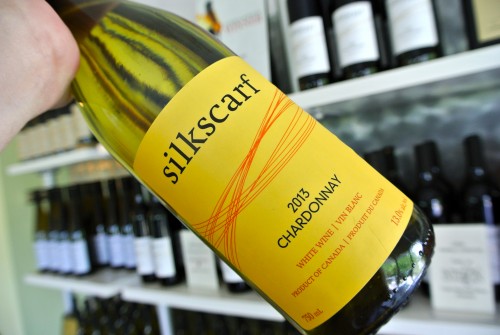 Silkscarf Unoaked Chardonnay 2013 ($21, 92 points) — I love this pure expression of Summerland Chardonnay. Made with no malo, and no lees stirring, the nose shows fresh green apple, lemon-citrus and just a hint of tropical fruits. It’s highly refreshing on the palate with pure flavours balanced by crisp acidity.
Silkscarf Unoaked Chardonnay 2013 ($21, 92 points) — I love this pure expression of Summerland Chardonnay. Made with no malo, and no lees stirring, the nose shows fresh green apple, lemon-citrus and just a hint of tropical fruits. It’s highly refreshing on the palate with pure flavours balanced by crisp acidity.
Silkscarf Ensemble 2008 ($33, 91 points) — A classic blend of Merlot, Cabernet Sauvignon and Cab Franc with aromas of cassis, figs, blackberry, chocolate and Espresso bean. Fantastic structure on the palate and harmonious fruit and spice.
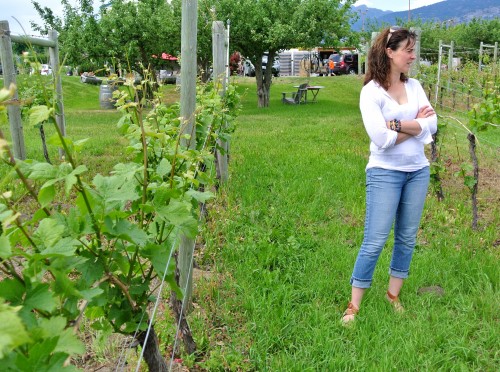 8th Generation Classic Riesling 2012 ($21, 88 points) — Classic, in this case, means bone dry. Look for a foundation of slate minerality and rousing citrus fruit on the nose. The citrus is pronounced on the palate with added grapefruit and apple notes and a zesty, fresh finish.
8th Generation Classic Riesling 2012 ($21, 88 points) — Classic, in this case, means bone dry. Look for a foundation of slate minerality and rousing citrus fruit on the nose. The citrus is pronounced on the palate with added grapefruit and apple notes and a zesty, fresh finish.
8th Generation Syrah 2012 ($25, 88 points) — The nose shows roasted meats, pepper, dark fruits and thick spice notes. It’s highly extracted on the palate with an array of fruit and spice.
Sumac Ridge Pinot Grigio Private Reserve 2013 ($15, 88 points) — I know the label says Grigio, but this is made in the Gris style. The nose shows rich peach, tangerine, star fruit, melon and ginger. It has wonderful texture in the mouth with fleshy ripe fruits that are well integrated and quite tasty.
Sumac Ridge Black Sage Shiraz 2012 ($24, 91 points) — I love the nose of plums, rosehips, boysenberry, roasted meats and spice. On the palate, the layers of rich fruit are joined by spice and a long, smooth finish.
Note: This story and most of the wine reviews originally appeared in Quench magazine







Comment here